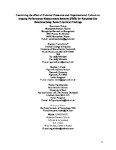Examining the effect of external pressures and organizational culture on shaping performance measurement systems (PMS) for sustainability benchmarking: Some empirical findings
| dc.contributor.author | Dubey, R | |
| dc.contributor.author | Gunasekaran, A | |
| dc.contributor.author | Childe, Stephen J | |
| dc.contributor.author | Papadopoulos, T | |
| dc.contributor.author | Hazen, B | |
| dc.contributor.author | Giannakis, M | |
| dc.contributor.author | Roubaud, D | |
| dc.date.accessioned | 2017-09-25T13:13:15Z | |
| dc.date.issued | 2017-11 | |
| dc.identifier.issn | 0925-5273 | |
| dc.identifier.issn | 1873-7579 | |
| dc.identifier.other | 0 | |
| dc.identifier.uri | http://hdl.handle.net/10026.1/9983 | |
| dc.description | View the original document on HAL open archive server: http://hal-audencia.archives-ouvertes.fr/hal-01558787 | |
| dc.description.abstract |
Sustainability benchmarking is gaining importance in industry. Despite its increasing popularity, the existing research utilizing theory to explain the organizations intention to shape performance measurement systems (PMS) for sustainability benchmarking is limited. Drawing upon institutional theory and organizational culture, this study investigates how institutional pressures motivate organizations to shape PMS for sustainability benchmarking and how such effects are moderated by organizational culture. The results of a survey of 277 respondents, gathered from Indian manufacturing firms, suggest that two of the dimensions of the institutional pressures (i.e. coercive pressures and normative pressures) are positively related to the PMS whereas the third dimension (i.e. mimetic pressures) does not affect PMS. Furthermore, organizational culture (i.e. flexible orientation and control orientation) plays a different role on the differential effect of coercive pressures, normative pressures and mimetic pressures on shaping PMS for sustainability benchmarking. The current manuscript offers an interesting contribution to the sustainability benchmarking literature: we integrate the perspectives of ‘external pressures’ and ‘organizational culture’ –as neither perspective, can on, its own can shape the PMS for sustainability benchmarking–, and ‘organizational structure’ under which the external pressures are most effective. From a practitioners' perspective, our study provides theory-driven and empirically-proven guidance for managers to understand the effect of external pressures and the role of organizational structure on PMS for sustainability benchmarking. | |
| dc.format.extent | 63-76 | |
| dc.language | en | |
| dc.language.iso | en | |
| dc.publisher | Elsevier BV | |
| dc.subject | Benchmarking | |
| dc.subject | Sustainability | |
| dc.subject | Sustainable operations | |
| dc.subject | Performance measurement systems (PMS) | |
| dc.subject | Sustainability measurements | |
| dc.subject | Institutional theory | |
| dc.subject | Organizational culture | |
| dc.title | Examining the effect of external pressures and organizational culture on shaping performance measurement systems (PMS) for sustainability benchmarking: Some empirical findings | |
| dc.type | journal-article | |
| dc.type | Journal Article | |
| plymouth.author-url | https://www.webofscience.com/api/gateway?GWVersion=2&SrcApp=PARTNER_APP&SrcAuth=LinksAMR&KeyUT=WOS:000414814700008&DestLinkType=FullRecord&DestApp=ALL_WOS&UsrCustomerID=11bb513d99f797142bcfeffcc58ea008 | |
| plymouth.issue | 0 | |
| plymouth.volume | 193 | |
| plymouth.publication-status | Accepted | |
| plymouth.journal | International Journal of Production Economics | |
| dc.identifier.doi | 10.1016/j.ijpe.2017.06.029 | |
| plymouth.organisational-group | /Plymouth | |
| plymouth.organisational-group | /Plymouth/Faculty of Arts, Humanities and Business | |
| plymouth.organisational-group | /Plymouth/Faculty of Arts, Humanities and Business/Plymouth Business School | |
| plymouth.organisational-group | /Plymouth/REF 2021 Researchers by UoA | |
| plymouth.organisational-group | /Plymouth/REF 2021 Researchers by UoA/UoA17 Business and Management Studies | |
| plymouth.organisational-group | /Plymouth/Users by role | |
| plymouth.organisational-group | /Plymouth/Users by role/Academics | |
| dcterms.dateAccepted | 2017-06-22 | |
| dc.rights.embargodate | 2018-12-27 | |
| dc.identifier.eissn | 1873-7579 | |
| dc.rights.embargoperiod | 18 months | |
| rioxxterms.versionofrecord | 10.1016/j.ijpe.2017.06.029 | |
| rioxxterms.licenseref.uri | http://www.rioxx.net/licenses/under-embargo-all-rights-reserved | |
| rioxxterms.licenseref.startdate | 2017-11 | |
| rioxxterms.type | Journal Article/Review |


